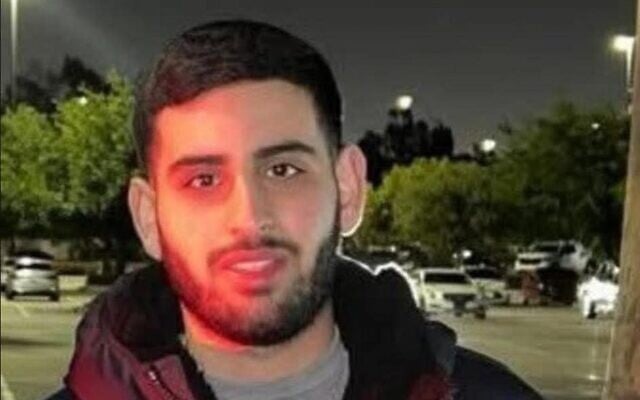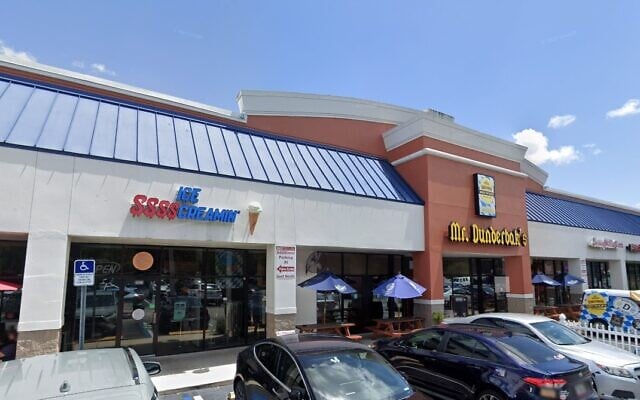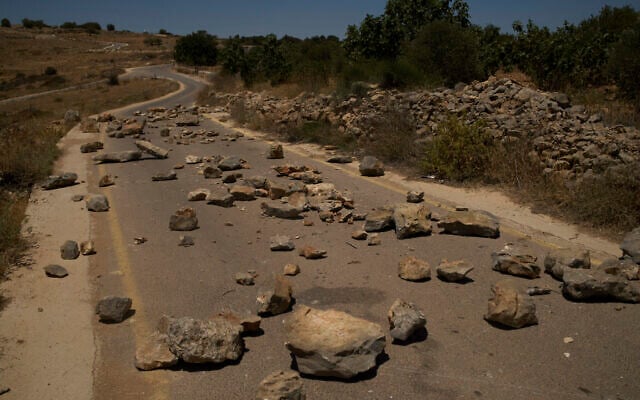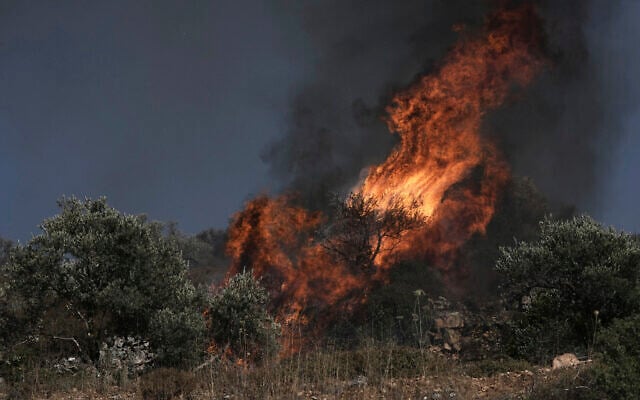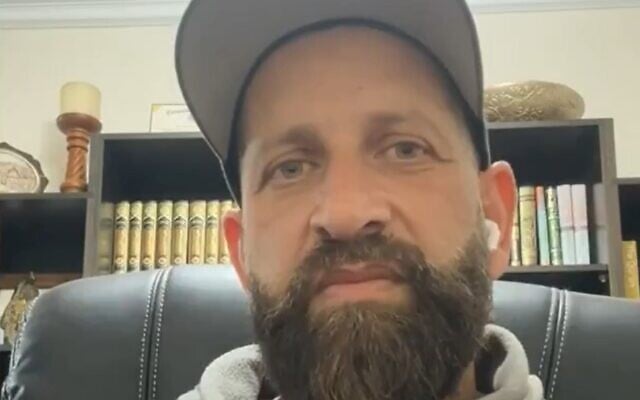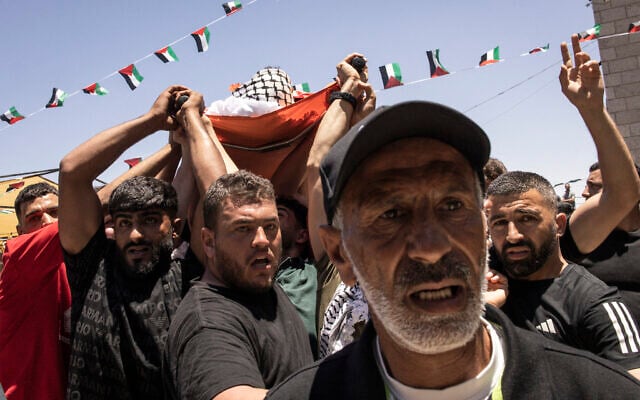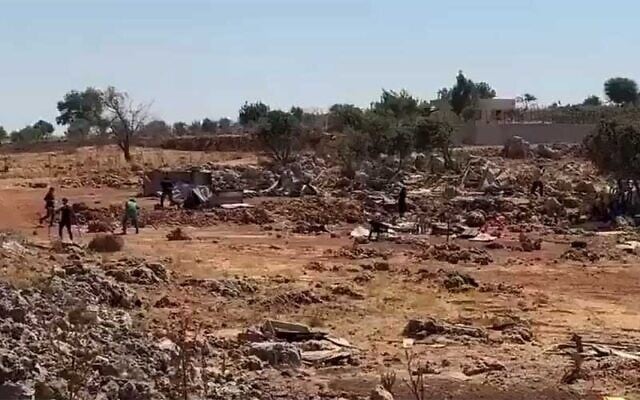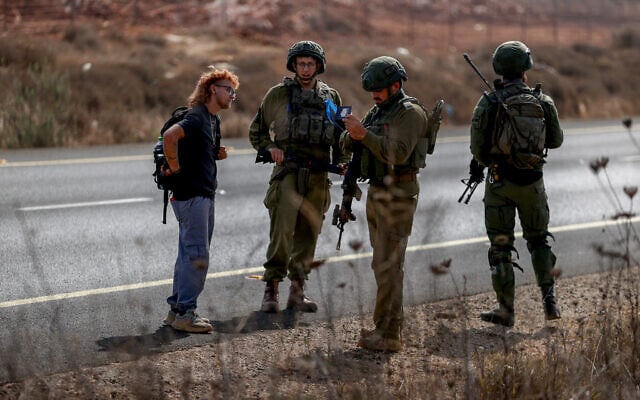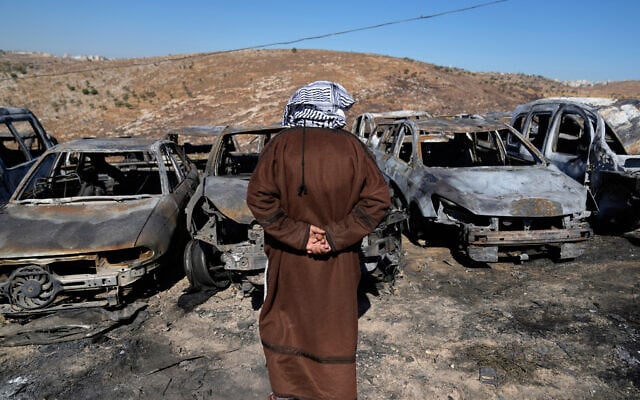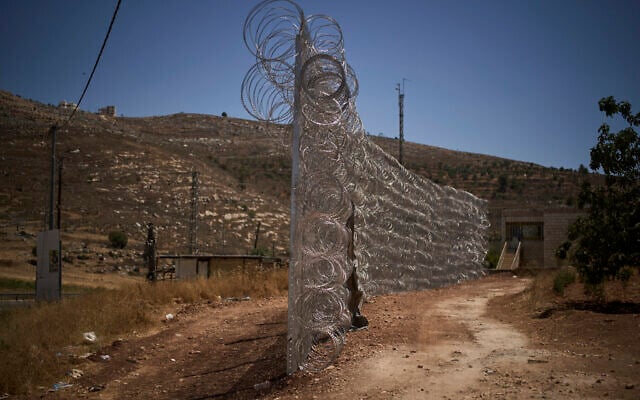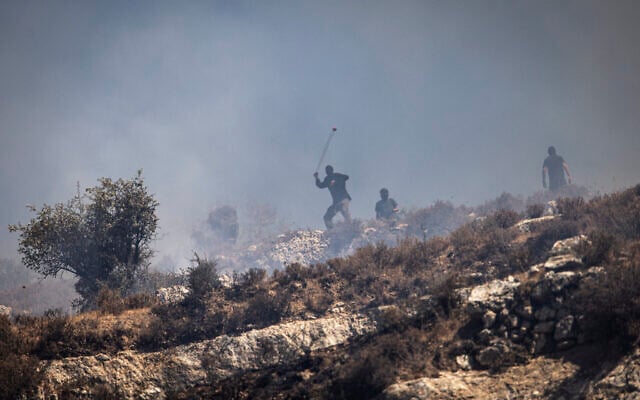


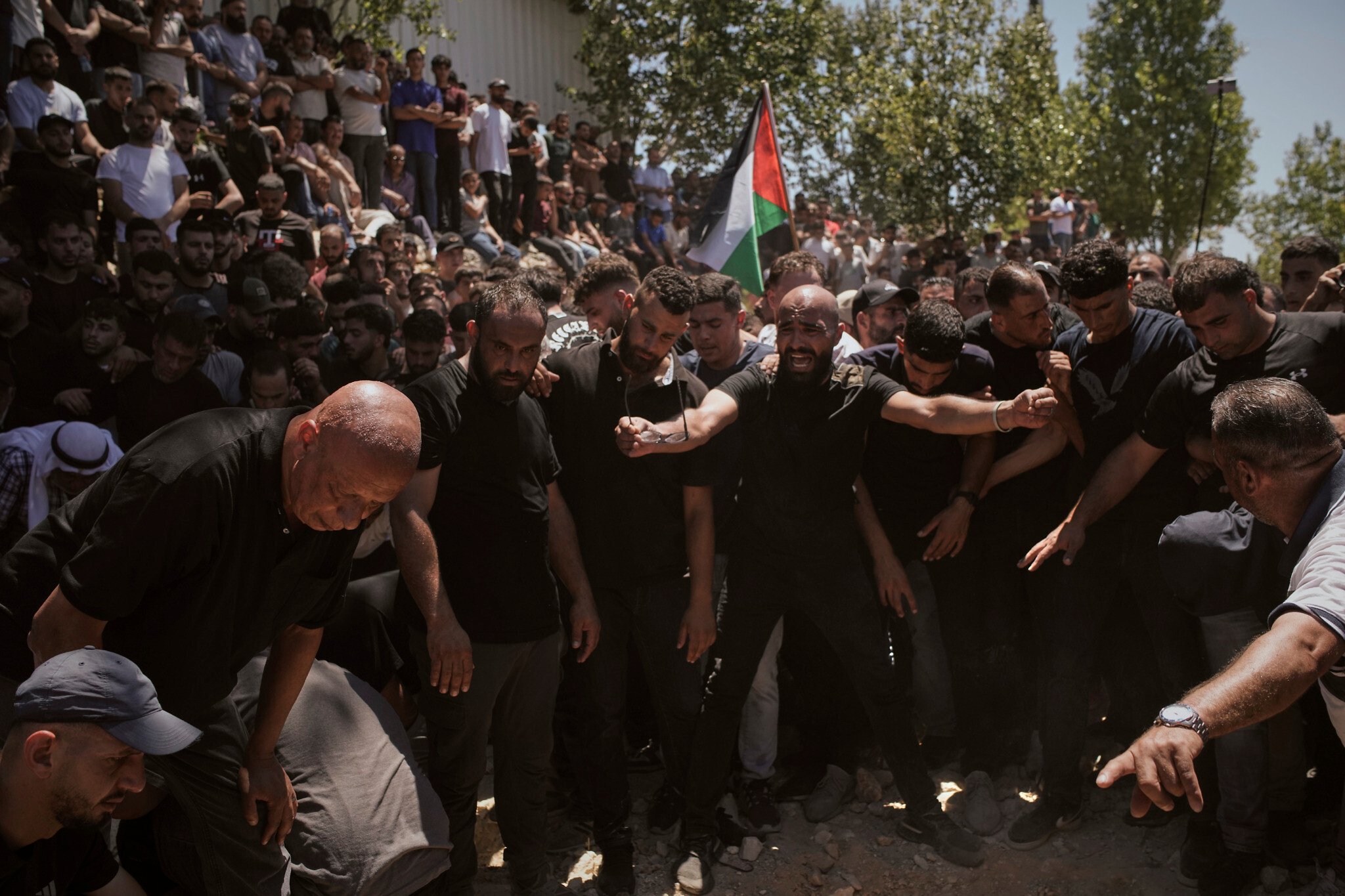
The last time Kamel Musallet spoke to his son, 20-year-old Palestinian-American Saif Musallet, the conversation turned to a familiar subject.
“He kept telling me, ‘Dad, I want to get married,’ over and over again,” Kamel recalled recently. “That was our last talk — he wanted to get married.”
The conversation had taken place over the phone, with the elder Musallet at his home in Florida, while Saif, a budding ice cream entrepreneur, visited his dad’s former hometown near Ramallah.
Days later, Kamel would be back in the West Bank himself to bury his son, who was killed Friday during a confrontation between Palestinians and Israeli settlers.
The incident, during which 23-year-old Palestinian Mohammad Shalabi was also killed, has drawn international attention due to Musallet’s American passport, shining a fresh light on rampant, deadly settler violence plaguing the area, which critics say Israeli authorities have allowed to metastasize and even supported.
It has also raised troubling questions due to the prolonged nature of the confrontation and the brutal nature of Musallet’s death. According to witnesses, the 20-year-old was beaten by settlers, and died hours later after Israeli troops allegedly prevented medical help from reaching him.
“He was just a kid who wanted to live,” Kamel told The Times of Israel this week.
On Tuesday, US Ambassador Mike Huckabee said he had asked Israel
“to aggressively investigate the murder” of Musallet.
“There must be accountability for this criminal and terrorist act. Saif was just 20 yrs old,” he tweeted.
The statement came after Musallet’s family released a statement on Saturday urging the US State Department to open an immediate investigation and hold the perpetrators accountable, citing Saif’s American citizenship.
Saif Musallet was born and raised in Port Charlotte, Florida, a quiet town of low-slung homes and human-made canals on the state’s west coast about 90 minutes south of St. Petersburg.
In 2024, he moved to Tampa and bought a branch of the Ice Sssscreamin’ ice cream shop, helping turn the business into a popular spot for University of South Florida students, according to the Tampa Bay Times.
About a month ago, he decided to take a break from slinging scoops to visit family in al-Mazraa ash-Sharqiya, a Palestinian town where his father had grown up. He planned to return to Florida later in the summer, with hopes of expanding the ice cream venture.
But on Friday, he became the latest victim of settler violence, in a clash that also saw several Palestinians and two Israelis injured.
According to witness accounts, family members and Palestinian media reports, the incident began Friday as Palestinians approached an illegal settler outpost between the towns of Sinjil, al-Mazraa ash-Sharqiya and Jiljilya as they attempted to reach their land.
Sinjil mayor Muataz Twafsha told The Times of Israel that settlers had established the outpost two months ago and had tried to lay claim to 6,000 dunams (1,500 acres) of village land.
“Anyone who tries to reach their land gets attacked. They throw stones, they beat us, they shoot. They are terrorists,” he said.
A week before, Palestinians in the area had set fire to makeshift outpost structures and a hillside near Sinjil and had planned to hold a protest march. But despite clashes with stone-throwing settlers, a wider conflagration was ultimately avoided.
This time, the confrontation escalated and settlers began descending toward Palestinian homes and attacking residents, witnesses said.
The Binyamin Regional Council, an Israeli jurisdictional authority in the area, described the incident in a Saturday statement as an attack on Jewish shepherds by “dozens of terrorists and Arab rioters.”
“They burned and vandalized equipment and a Torah book and injured two shepherds,” the statement read.
In footage from the incident, both settlers and Palestinians can be seen throwing stones. In one clip, masked individuals in an Israeli vehicle hurl rocks at a Palestinian car, smashing its windows.
According to Palestinian sources who spoke to The Times of Israel, in addition to the two people killed, dozens of residents from nearby villages were wounded, some of whom required hospital treatment. According to the police, two settlers were injured during the incident, one of them in the head.
Musallet said he was told by witnesses that Saif and some other Palestinians went to an area where his family owned land. When he got there, settlers had not yet reached the area, but they soon arrived.
At some point, Saif was separated from the others and “beaten with hands and stones,” according to Musallet, though it was not clear if this was witnessed directly.
A badly injured Saif was found later, first by two Palestinians and then by his little brother, who was also visiting from Florida.
“He was throwing up, unresponsive, but still breathing,” Musallet said.
Help was called, but the Israeli military blocked ambulance access for hours, the father said he was told. The incident took place in Area B of the West Bank, where Palestinians maintain civilian authority, but the Israeli military holds security control.
“They said it required coordination,” Musallet said. “Why? It’s our land.”
He said it took around three hours for the ambulance to finally reach the area.
“I believe 100% that had they reached him earlier, he would have survived,” he said. “If you get to an ambulance within 10 or 20 minutes, they’ll give you the CPR you need, the medication you need. But after three hours — that’s a long time. He suffered for a very long time. ”
According to Musallet, once the ambulance was allowed to approach, it still could not access the hill where his son lay dying. Medics instead had to park below and carry a stretcher up the slope.
By the time they reached Saif, it was too late.
“Saif took his last breath right before they reached him,” Musallet said, quoting his younger son, who stayed with an unresponsive Saif for much of the time.
According to Palestinian media, settlers also smashed the windows of a Palestinian ambulance that had arrived at the scene to evacuate wounded Palestinians.
Twafsha charged that ambulances could have also saved the second victim, Shalabi, who was shot to death in the area between Sinjil and Jiljilya. His body was only found after 10 p.m. that night.
The IDF did not respond to a Times of Israel inquiry about the claims that ambulances were prevented from accessing victims.
According to reports, Israeli soldiers were not on the scene when either victim was attacked or killed. No footage is known to exist of either the killing or the ensuing hours.
In response to the incident, the IDF said soldiers, police and Border Police officers were dispatched to the scene after reports of “friction between Israelis and Palestinians” and “acted to disperse the confrontation.”
“During the events, several Israelis and Palestinians were detained by the Israel Police on suspicion of involvement in violent incidents. A joint investigation has been opened by the Israel Police and the Military Police Criminal Investigation Division. A reservist was questioned and released after interrogation. No further details can be provided at this stage.”
Two Israeli minors were arrested following the attack, though neither of them is suspected of the murders, and they were subsequently released to house arrest.
Police also detained two left-wing Israeli activists, releasing them without charge that night, and a Palestinian named Abdullah Hmeida, who was held for five days before being released without charges on Tuesday.
Jonathan Pollak, a prominent activist who was among the two arrested, said he personally witnessed the army standing by settlers hours into the violence without taking action.
He recalled that after being detained, he watched as troops ignored the settlers leaving the area in a convoy following the violence.
“There’s no way it could’ve been anyone other than those who took part in the lynching,” he claimed. “And everyone was there — the army, Border Police — arguing over who would take us to the station. No one thought to stop those settlers, not even to question them. This was well after it was known there had been a pogrom. I don’t know if it was already known that someone had been killed, but it was known there had been a pogrom.”
Pollak said he had been in the area on Friday afternoon to help protect a Palestinian family that lived near the outpost between Sinjil and Jiljilya.
“Settlers have repeatedly targeted that family. In recent months, settlers from the same area have also driven out a local Bedouin community,” he said. “We were told settlers were on the hill above, attacking Palestinians and had stolen livestock from a family.”
Pollak said he and two activists climbed the hill to see what was happening, and came upon an older man who was allegedly hit by a pickup truck driven by a settler and was being helped away by Hmeida.
“We started helping evacuate him, but he was heavy and had trouble walking,” Pollak recalled. “Then, suddenly, settlers came down the hill. There were 10 or 15 of them. We were five — two Palestinians, one of whom was injured, and three Israeli activists. The settlers had black police batons; some were masked, others not. They attacked the Palestinian man who was carrying the injured person, and then me.”
Soldiers quickly arrived on the scene, but did not seem interested in going after the assailants. One activist managed to help the wounded Palestinian leave the area, but Pollak, the other activist and Hmeida were held. Only Hmeida was handcuffed.
“The soldiers told the settlers to leave. No one was arrested,” he said. “The army and settlers are part of the same system — one that operates seamlessly, all serving a clear policy: to expel Palestinians from their land.”
Twafsha, the mayor of Sinjil, told The Times of Israel that life in his community has drastically worsened since the start of the war in Gaza nearly two years ago.
The town sits in an area north of Ramallah that has seen settler activity intensify in recent months, with reports of settlers attacking Palestinians, setting fire to property and intimidating those trying to access agricultural land in areas where settlement outposts have mushroomed. During Friday’s attack, settlers set fire to Palestinian buildings and vehicles in both Sinjil and al-Mazraa al-Sharqiya, he noted.
“There have never been settlements on these lands surrounding our homes. Since the war began, four outposts have sprung up around Sinjil — on private Palestinian land,” Twafsha said. “Palestinians are not allowed to access those lands. Any Palestinian who tries to approach is either stopped and told there’s a state of emergency [due to the war in Gaza], that the area is off-limits, or gets beaten by settlers to prevent him from entering. We are living in a giant prison. From the east, there are settlers, from the west, there are settlers.”
Israel recently erected a high fence cutting off parts of Sinjil from Road 60, which runs through the entire West Bank from north to south, and which both Israelis and Palestinians use. The IDF said the fence was erected to protect the nearby Ramallah-Nablus highway “in light of the recurring terror incidents in this area.”
Twafsha said access to the village had been reduced to a single opening in the fence. The army maintains that the opening means there is still “free access” to the town, but Twafsha disputed the claim and accused Israel of exacting “collective punishment” on Sinjil.
“Some days the army opens it, some days it closes it,” he said of the remaining gate. “There’s no Hamas in Sinjil. Never has there been gunfire from here at settlers or the army. But they want to take our land, displace us and kill us.”
On Tuesday, UN rights office spokesman Thameen Al-Kheetan said 757 attacks by Israeli settlers had been recorded in the West Bank during the first half of the year, a 13 percent increase on the same period in 2024.
The attacks injured 96 Palestinians in the territory in June alone, he told reporters, stressing that it was the highest monthly injury toll of Palestinians from settler attacks “in over two decades.”
Despite now living far away, Musallet expressed frustration and despair over the settler attacks.
“They burn houses, they burn trees. Why are they doing this? What’s the goal?” he asked. “I want international pressure, international organizations to stop this.”
Musallet acknowledged to The Times of Israel that he sees his son’s American citizenship as a pathway to spurring international pressure to stop the attacks.
“We can’t get our son back — he’s in the ground. But I don’t want more death. Why can’t American pressure, the American government, help and stop the settlers from coming here? That’s the main thing,” he said. “We don’t want more settler violence.”
The deaths of Palestinian-Americans in the West Bank at the hands of Israeli soldiers have in the past has prompted public statements from Washington, including calls for investigations and, in rare cases, compensation. However, there is no precedent for state compensation or extensive official investigations when Israeli civilians — rather than soldiers — are implicated in the killing.
Musallet insisted that he was not looking for compensation anyway.
“I want the killing to stop. I don’t want any more young people to die. No amount of money in the world will bring back my child,” he said.
The father paused mid-conversation to speak to his younger son, who days earlier had watched his big brother die before his eyes as medics who could have been there hours earlier struggled up a parched West Bank hill. A big brother who had just wanted to get married and serve ice cream to American college kids.
“After the death of my son, my entire outlook changed — every moment I have with my children now is precious,” Kamel Musallet said. “Even when they annoy you, be patient. That’s my advice. Because you always think your children will bury you, you never think you’ll have to bury them.”

